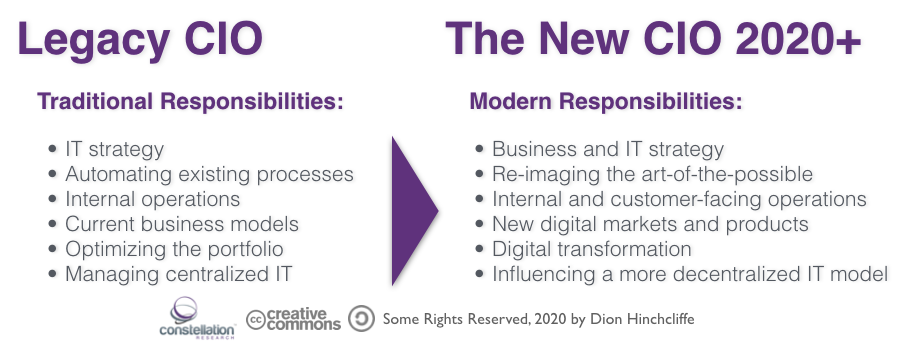2020 has ushered in yet another definitive shift in the role of the top technology leader in most organizations. While I have been discussing the steadily changing responsibilities of the Chief Information Officer (CIO) for quite a few years now, we now see that this is finally the moment that the CIO becomes a business leader, first and foremost.
While the title of this post may be provocative for some, from my vantage point it's simply stating the reality today. Whether or not the CIO wants to or is ready to -- and regardless of what the rest of the C-Suite or board believes -- the CIO role is now critical to the business strategy of almost every organization.
The reason is simple: Technology now drives the global economy. Because digital infuses and pervades almost every aspect of the our organizations today, as well creating virtually all the major new markets-- and consequently, vital growth -- it makes technology a top driver of business strategy today.
This is not to say that the CIO will lead all business strategy. Far from it. But only those who are deeply familiar with both the technology landscape and have long experience with the profound challenges and difficulties of actually realizing digital solutions, will be able to successfully navigate the complex onrushing pathways that give access to the future for the business.
This ability to map out, articulate, and rally the organization around the digital art-of-the-possible can only be done by what is increasingly called the Qualified Technology Executive (QTE). A QTE is a leader wbo posseses a significant amount of current technology-relevant domain experience. As a QTE personally, I have a pretty clear sense of how long it takes to become one, even if one is determined. At least 10 years. This includes both study as well as previous hands-on experience with multiple large scale business/technology transformaitons.
The result is that most organizations lack sufficient QTEs to successfully undergo digital transformation. Yet such transformations are a top five CEO priority around the globe right now as most companies realize they now are also tech companies. The current consensus in the industry that it is only a matter of time before QTEs are mandatory on boards (it is very surprisingly to me frankly, that this is not already the case.) In other words, sufficient digital experience is lacking at the top in the majority of organizations to step in and drive the overall go-forward strategy of the business.
The result of all this is that there is no one else that can completely lead business strategy at the executive level. The answer has sometimes been that the Chief Digital Officer (CDO) or even the Chief Marketing Officer (CMO) could also potentially be a top-level QTE. To this I'd observe that the first simply doesn't have control of the IT systems, the data, and the majority of the technology budget like the CIO has. Most CDOs also don't have a big enough purview, a sufficiently large or coherent staff, or a big enough budget to transform the business. The CIO usually does.
These are the reasons why so many CIOs have recently been given the CDO role too. It is part of an overall digital restructuring of the C-Suite, which will likely become nearly total and profound in the next few years as enterprises become fundamentally experience-driven organizations. As to the CMO, they usually are not QTEs, though in organizations where they are, it's certainly a possibility they will help lead business strategy too.
An aside: Worryingly to me, even the CIO barely has the resources in many organizations to succeed at delivering the full range of digital change required today (my current analysis is that IT has been underfunded for years in the typical enterprise by about 30-50%.)
The reason this has come to a head in 2020 is that there is no more digital runway. From my research and conversations, the clock has clearly run out for most enterprises. The proverbial can cannot be kicked down the road (though some will no doubt try.) There is no time to make other executives into QTEs, or even enough time to to replace enough executives with QTEs, although this last part is perhaps debatable, although a non-starter in most organizations. The CIO is the last role standing that can deliver on the full end-to-end job of sustainable business strategy and execution, albeit in close conjunction with the rest of the "top table."
Executable Imagination of the Future
Many of us have used the line that the CIO used to be a Chief Infrastructure Officer and is now slowly turning into a Chief Innovation Officer. What's called for now is more than just innovation. It's a far-ranging rethink of our businesses, markets, products, partners, supply chains, and even our customers. The CIO in 2020 and beyond must become the Chief Imagination Officer, in a way that thinks broadly, widely, and deeply well into the future, understands the various chess moves that must be made to pathfind -- then supercharge -- the right way forward. They must be able to articulate all this to the organization and marshal them around the changes.
This is part of what all the talk is about digital transformation not being about technology (despite it also being about technology.) It's about the people, the talent, a willingness to change, and an actionable and clear vision forward into the future. The old CIO as a largely technology role is officially over (though zombies will of course continue to exist for some time.) Long live the new CIO.
Additional Reading
CIO Predictions Going Into 2020
The evolving role of the CIO and CMO in customer experience
Six Trends Affecting the Innovation-Led CIO
Our List of Top Industry QTEs: The Business Transformation 150 for 2020



